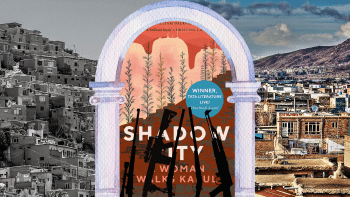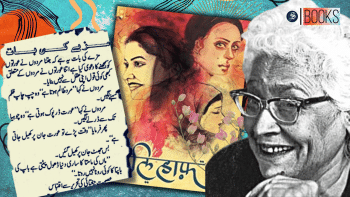Why Iceland is a masterclass in equality

If the Nordic nation of Iceland did not already exist, we might just have had to dream up such a place.
It is consistently ranked as one of the cleanest, greenest, happiest, healthiest, most peaceful, most educated countries in the world. But as we learn from Secrets of the Sprakkar: Iceland's Extraordinary Women and How They Are Changing the World, Eliza Reid's joyful book, which came out in 2022, Iceland's most remarkable achievement yet might be achieving that most elusive of things: the gold standard for gender equality.
This is no mere opinion: Year after year, Iceland takes top spot in the Gender Gap Index, and it is all part of a deeply egalitarian and evolving culture that makes up Icelandic society.
The ancient Icelandic word 'sprakkar' refers to extraordinary women, and the Icelandic sagas and folklore are full of them. In putting together a picture of modern-day Iceland, Reid interviews numerous Icelandic women across all fields—politics, business, sports, the arts, and other professions thought of as traditionally masculine, such as search and rescue operations—and highlights the lives and achievements of these individuals on a very personal, human level while at the same time painting a broader picture of Icelandic society and where it is headed.
The book feels like a seamless blend of memoir, feature journalism, extended op-ed, and treatise on gender, and manages to be more than all those things – the interviews bring out individual stories on a micro level, while the narrative deftly switches to the macro level to shed light on Icelandic culture and policy that makes it possible for women to flourish in this way. Reid writes with candour, humility, and a sense of humour (I laughed out loud at least twice) which makes Sprakkar a fast and entertaining read, and manages to avoid sounding didactic or condescending. I burned through it in one weekend.
At the heart of all these stories is Eliza Reid's own improbable journey. Raised in rural Ontario, she met Gudni Th. Johanesson while studying modern history at Oxford University in the UK. The two became a couple, moved to Iceland, got married. Reid worked as a journalist and freelancer for various publications, including Icelandair's in-house magazine, and co-founded the Iceland Writers Retreat, an annual writers' conference held in Reykjavik (for which yours truly is an IWR Alumni Award Winner).
Meanwhile, though Johanesson's primary interests seemed to be academic rather than political, as fate would have it, he ended up entering the presidential election and winning. This is how in 2016, Eliza Reid, who immigrated to Iceland for a reason as simple as love, found herself First Lady of her adopted country, in the glare of the media spotlight, dining next to kings and queens in state visits, trying to get used to head-of-state protocol.
The process of reading Reid's book then, was simultaneously uplifting and depressing for me: Uplifting because it showed what was possible, depressing because it made the contrast with my own country all the more glaring.
Becoming First Lady of a foreign nation was not something Reid had imagined before or aspired to, and she has not allowed the tag to change her in any fundamental way. And yet, she is fully aware of the huge megaphone that comes with the status of First Lady, and as such, knows better than to pass up this privilege to do some good. Secrets of the Sprakkar is a part of her attempt to use this platform to influence positive change, and if the message of equality sells more books and reaches more people globally when coming from a First Lady—of the country that has been scientifically confirmed as the most gender equitable place in the world no less—then where is the harm?
Before diving into the story of various sprakki, we learn of Reid's own journey, her challenges as an outsider in a new land, as a writer and journalist, as an entrepreneur, as a mother of four. A passage detailing her nightly schedule while trying to raise small children of various ages is funny enough to be straight out of a Monty Python skit. Then we meet a series of Icelandic women, all trailblazers in their own way, all examples of what is possible if the playing field is levelled.
There is Ragnhildur Agustsdottir, entrepreneur and co-creator of the immersive Icelandic Lava Show, who also worked in the tech sector and became a CEO at age 25, a fact that shows that it is possible not only for women, but young women, to be taken seriously in fields largely gate-kept by men. There is Halldora Kristin Unnarsdottir, captain of the fishing vessel Andri, who shows that achieving expertise at running fishing vessels in harsh waters and sub-zero temperatures, where the waterproof suits have not been designed keeping women in mind, is not exclusively male territory. There is soccer player Margret Lara Vidarsdottir, one of the biggest names in sports in Iceland, one of the rare countries where the excitement and importance surrounding women's soccer is on par with the men's game.
Heroes aside, we also learn about, for example, Iceland's permissive culture. There is virtually no stigma attached to casual sex, and no outmoded expectations for men to make the first move in the dating scene. Babies born outside of marriage are quite common, and the government is better than any other nation in supporting single mothers. Parental leave is generous, and the choices and decisions by all are respected. In a humorous aside about the non-judgmental Icelandic view on sexuality, we learn the term kviðsystur, meaning "stomach sisters"—that is, women who have slept with the same man.
Now, while permissive sexuality does not necessarily, in and of itself, reflect gender equality, it is certainly the upshot of a lack of an oppressive culture of shame that exists in many societies. And let's face it, it is generally women bearing the brunt of that shame. In Icelandic society though, consent is paramount, and on the legal level there is absolutely no tolerance for sexual assault, harassment, or abuse of any kind.
As a Bangladeshi, I have always thought of Iceland as a kind of conceptual opposite of Bangladesh. My capital city, Dhaka, boasts a lot of superlatives, none of them desirable. Our air and water are the most polluted (Iceland's are the cleanest), our cities are the most densely populated and our traffic congestion the worst in the world (Iceland is one of the most sparsely populated countries in the world, and traffic congestion is unheard of). My country is a hotbed of crime and violence (Iceland is the safest country in the world, with "hard crime" generally consisting of teenagers breaking into the community swimming pool after hours).
In terms of gender equality too, Bangladesh has performed disastrously. Yes, we have a female prime minister, but so what? The political field here is far from participatory or inclusive. Child marriage is still rampant, our conjugal laws are stuck in the Penal Code of 1860, and the understanding of the concept of consent is appallingly low among young boys and men. The Covid-19 pandemic only dealt another blow to an already bad situation.
The process of reading Reid's book then, was simultaneously uplifting and depressing for me: Uplifting because it showed what was possible, depressing because it made the contrast with my own country all the more glaring. Laws that not only require companies to pay equal wages to men and women for equal work, but require them to prove that they are doing so; a governmental support system that allows a woman to choose how many children she wants to have without financial woes imposing that decision on her; a culture where it is acceptable for member of parliament Unnur Bra Konradsdottir to take the podium while nursing her child, because motherhood is the most natural thing in the world and not something obscene to be kept out of view—in all of these scenarios, Iceland is blazing the path, and the rest of the world is a long way from catching up.
One should not fall into the trap, though, of thinking Iceland is some sort of perfect world. Even in Iceland, misogyny still exists, abuse does happen. At the end of the day, a nation is made of its people—imperfect human beings trying to do their best. From time to time, backdated attitudes do rise to the surface, like the pressure to have children (though the pressure for marriage seems largely absent).
I shuddered with recognition at Reid's account: "Gudni and I had been a couple for five years when I moved to Iceland in my late twenties. From the outset, there were nudges, winks, and often outright questions from well-meaning in-laws and new Icelandic friends about when we would get on with it (since Gudni already had a daughter, it was clear to them that any delay in our procreation must be entirely my doing). When we got married a year later, the pressure only increased […] Someone asked me if perhaps I was simply scared of having children."
Ah, nosy in-laws! It is strangely comforting to know that, Iceland or Bangladesh, some things just never change …
Abak Hussain is a journalist and Contributing Editor at MW Bangladesh. He is a winner of the Iceland Writers Retreat Alumni Award.

 For all latest news, follow The Daily Star's Google News channel.
For all latest news, follow The Daily Star's Google News channel. 









Comments